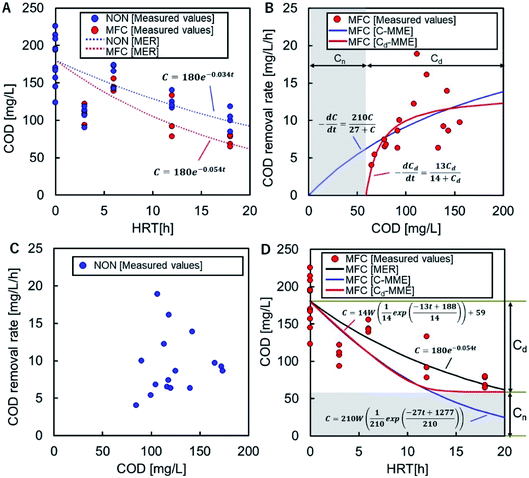水環境微生物工学研究室の成果がRSC advancesに発表されました
Estimation of total energy requirement for sewage treatment by a microbial fuel cell with a one-meter air-cathode assuming Michaelis–Menten COD degradation
Taiki Yamane , Naoko Yoshida and Mari Sugioka, RSC Advances, 2021, 11, 20036 – 20045
Calculations of chemical oxygen demand (COD) degradation in sewage by a microbial fuel cell (MFC) were used to estimate the total energy required for treatment of the sewage. Mono-exponential regression (MER) and the Michaelis–Menten equation (MME) were used to describe the MFC’s COD removal rate (CRR). The tubular MFC used in this study (ϕ 5.0 × 100 cm) consisted of an air core surrounding a carbon-based cathode, an anion exchange membrane, and graphite non-woven fabric immersed in sewage. The MFC generated 0.26 A m−2 of the electrode area and 0.32 W m−3 of the sewage water, and 3.9 W h m−3 in a chemostat reactor supplemented continuously with sewage containing 180 mg L−1 of COD with a hydraulic retention time (HRT) of 12 h. The COD removal and coulombic efficiency (CE) were 46% and 19%, respectively, and the energy generation efficiency (EGE) was 0.054 kW h kg−1-COD. The CRR and current in the MFC were strongly dependent on the COD, which could be controlled by varying the HRT. The MER model predicted first-order rate constants of 0.054 and 0.034 for reactors with and without MFC, respectively. The difference in these values indicated that using MFC significantly increased the COD removal. The results of fitting the experimental data to the MME suggested that the total COD can be separated into nondegradable CODs (Cn) and degradable CODs (Cd) via MFC. The values of CRR for Cd and CE suggest that MFC pretreatment for 12 hours prior to aeration results in a 75% decrease in net energy consumption while reducing sewage COD from 180 to 20 mg L−1.

全文こちらからアクセスできます



